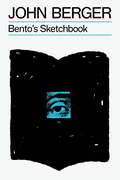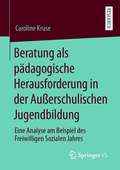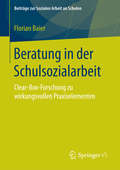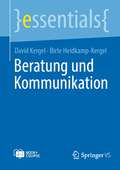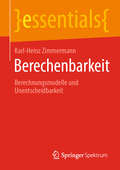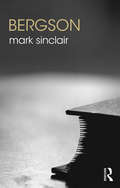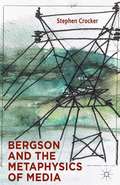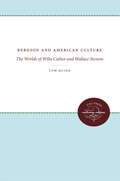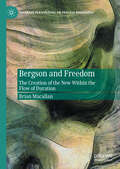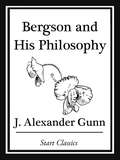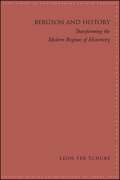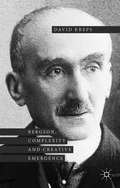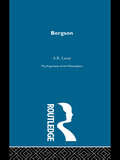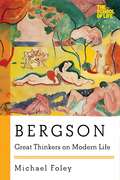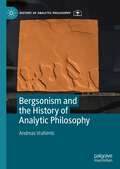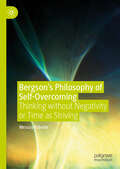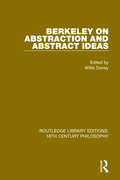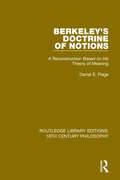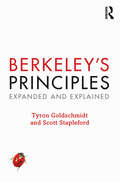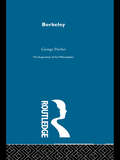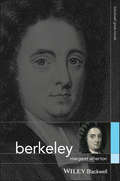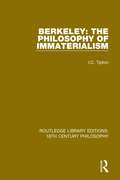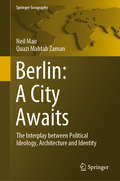- Table View
- List View
Bento's Sketchbook
by John BergerA deeply moving exploration of the relationship between thinking and drawing, from the author of the groundbreaking Ways of SeeingThe seventeenth-century philosopher Baruch Spinoza (a.k.a. Bento) spent the most intense years of his short life writing. He also carried with him a sketchbook. After his sudden death, his friends rescued letters, manuscripts, notes—but no drawings.For years, without knowing what its pages might hold, John Berger has imagined finding Bento&’s sketchbook, wanting to see the drawings alongside his surviving words. When one day a friend gave him a beautiful virgin sketchbook, Berger said, &‘This is Bento&’s!&’ and he began to draw, taking inspiration from the philosopher&’s vision.In this beautifully illustrated book, Berger uses the imaginative space opened up in this experiment to explore politics, storytelling, Spinoza&’s life and times, and the process of drawing itself.
Beratung als pädagogische Herausforderung in der Außerschulischen Jugendbildung: Eine Analyse am Beispiel des Freiwilligen Sozialen Jahres
by Caroline KruseBeratung in jugendpädagogischen Handlungsfeldern spielt in der Disziplin Erwachsenenbildung/ Außerschulische Jugendbildung (EB/AJB) eine weitestgehend vernachlässigte Rolle. Insbesondere vor dem Hintergrund des jugendtheoretischen Konsenses über eine Zunahme des Beratungsbedarfs von jungen Menschen beansprucht die Studie von Caroline Kruse, einen professionsorientierten Beitrag zur Profilierung von Beratung in der AJB zu leisten.Das im Rahmen ihrer Untersuchungen aufgenommene empirische Bild der Beratungspraxis im Freiwilligen Sozialen Jahr (FSJ) zeigt: Jugendbildungsreferent*innen werden vermehrt mit beraterischen Anforderungen konfrontiert und aus berufspraktischer Perspektive erfährt Beratung in diesem Handlungsfeld einen deutlichen Bedeutungszuwachs. Die Ergebnisse belegen weiter, dass das FSJ besondere förderliche Rahmenbedingungen aufweist, um auf die (zugenommene) Beratungsbedürftigkeit reagieren zu können. Gleichzeitig fehlt es an institutionellen Anerkennungs- und Unterstützungsformen. Beratung wird damit weitestgehend der individuellen Bereitschaft und des selbst zu verantwortenden Wissens und Könnens der Jugendbildungsreferent*innen überlassen.
Beratung in der Schulsozialarbeit: Clear-Box-Forschung zu wirkungsvollen Praxiselementen (Beiträge zur Sozialen Arbeit an Schulen #6)
by Florian BaierIn diesem Buch wird ein vom Schweizerischen Nationalfonds (SNF) gefördertes Forschungsprojekt vorgestellt, in dem der Frage nachgegangen wurde, wie in Schulsozialarbeit und Jugendarbeit Wirkungen und Nutzen erzeugt werden. Das Projekt wurde als Clear-Box-Forschung konzipiert und in einer Kleinstadt in der Schweiz durchgeführt. Es wurden verschiedene qualitative und quantitative Methoden eingesetzt (Videographie, Interviews, Beobachtungen, standardisierte Befragungen). Die Ergebnisse des Projekts liefern Impulse auf drei Ebenen: erstens leisten sie einen Beitrag zur weiteren Professionalisierung der beiden Handlungsfelder, zweitens tragen die theoretischen Generalisierungen zu einem vertieften Verständnis von Schulsozialarbeit und Jugendarbeit bei und drittens werden forschungsmethodologische und erkenntnistheoretische Herausforderungen der Kombination verschiedener Erhebungsmethoden aufgezeigt.
Beratung und Kommunikation (essentials)
by David Kergel Birte Heidkamp-KergelDer vorliegende Band liefert eine kurze und praxisorientierte Einführung in Beratungs- und Kommunikationsstrategien. Dabei stehen lösungsorientierte Formen der Kommunikation sowie praxisorientierten Übungen im Fokus der Darstellung. So werden v.a. Strategien vermittelt, die ressourcenorientiert die Potenziale und Stärken der Gesprächspartner*innen adressieren. Neben Kommunikationsmodellen zur Konfliktlösung werden daher Beratungsansätze und Fragestrategien praxisorientiert dargestellt, durch die Stärken identifiziert, Ressourcen aktiviert und Wachstumspotenziale freigelegt werden können.Den kostenlosen Zugang zum Online-Kurs finden Sie direkt im Buch.
Berechenbarkeit: Berechnungsmodelle und Unentscheidbarkeit (essentials)
by Karl-Heinz ZimmermannIn diesem essential werden wesentliche Konzepte der Berechenbarkeitstheorie erörtert. Zunächst werden unterschiedliche Modelle der Berechenbarkeit eingeführt und ihre semantische Gleichwertigkeit gezeigt. Dieses Resultat steht in Einklang mit der Church-Turing-These, nach der jede intuitiv berechenbare Funktion partiell-rekursiv ist. Neben zentralen Instrumenten der Berechenbarkeit, wie etwa der Gödelisierung von berechenbaren Funktionen und der Existenz universeller berechenbarer Funktionen, stehen unentscheidbare Probleme im Fokus, wie etwa das Halteproblem sowie das Wortproblem für die Term-Ersetzung. Semi-entscheidbare Mengen werden beleuchtet und die zentralen Sätze von Rice und Rice-Shapiro werden skizziert.
Bergson (The Routledge Philosophers)
by Mark SinclairHenri Bergson (1859-1941) was one of the most celebrated and influential philosophers of the twentieth century. He was awarded in 1928 the Nobel prize for literature for his philosophical work, and his controversial ideas about time, memory and life shaped generations of thinkers, writers and artists. In this clear and engaging introduction, Mark Sinclair examines the full range of Bergson's work. The book sheds new light on familiar aspects of Bergson’s thought, but also examines often ignored aspects of his work, such as his philosophy of art, his philosophy of technology and the relation of his philosophical doctrines to his political commitments. After an illuminating overview of his life and work, chapters are devoted to the following topics: the experience of time as duration the experience of freedom memory mind and body laughter and humour knowledge art and creativity the élan vital as a theory of biological life ethics, religion, war and modern technology With a final chapter on his legacy, Bergson is an outstanding guide to one of the great philosophers. Including chapter summaries, annotated further reading and a glossary, it is essential reading for those interested in metaphysics, time, free will, aesthetics, the philosophy of biology, continental philosophy and the role of European intellectuals in World War I.
Bergson And The Metaphysics Of Media
by Stephen CrockerWhat is a medium? Why is there always a middle? Can media produce 'immediacy'? Henri Bergson recognized mediation as the central philosophical problem of modernity. This book traces his influence on the 'media philosophies' of Gilles Deleuze, Marshall McLuhan, Walter Benjamin and Michel Serres.
Bergson and American Culture: The Worlds of Willa Cather and Wallace Stevens
by Tom QuirkBergsonian "vitalism" challenged the dominance of Spencerian determinism in the early twentieth century and seemed to offer a new foundation for belief in human freedom and individual possibility. Quirk traces the impact of Bergsonism upon the American sensibility and shows how individual writers -- particularly two such different artists as Willa Cather and Wallace Stevens -- appropriated vitalistic notions and made them serve the peculiar requirements of their own unique creative imaginations.Originally published in 1990.A UNC Press Enduring Edition -- UNC Press Enduring Editions use the latest in digital technology to make available again books from our distinguished backlist that were previously out of print. These editions are published unaltered from the original, and are presented in affordable paperback formats, bringing readers both historical and cultural value.
Bergson and Freedom: The Creation of the New Within the Flow of Duration (Palgrave Perspectives on Process Philosophy)
by Brian MacallanThis book provides the first full length treatment of the nature and function of freedom within the work of Henri Bergson. It does so while also introducing Bergson’s key ideas and major works. It explores Bergson through the lens of freedom, while at the same time showing how Bergson’s work might engage with current challenges. It does this by examining the four major works of Bergson, highlighting how freedom can be conceived in each text and how Bergson addresses key freedom problematics in those works. It offers a definition of freedom in Bergson as the “creation of the new within the flow of duration.” What emerges, is that freedom remains crucial for Bergson beyond the obvious treatment of freedom directly in Time and Free Will. Free will, memory, evolution, religion, and morality are major themes for Bergson. Moreover, there are particular freedom problematics concerning each of those themes that illustrate the central importance of freedom in Bergson. These include determinism, dualism, materialism, mechanism, finalism, and the notion of the open and closed.
Bergson and His Philosophy
by J. Alexander GunnBergson and His Philosophy was originally published in 1920 by John Alexander Gunn, an author of philosophy books and Ph.D. graduate from university of Liverpool.
Bergson and History: Transforming the Modern Regime of Historicity (SUNY series in Contemporary French Thought)
by Leon ter SchureHenri Bergson is famous for his explorations of time as duration, yet he rarely referred to history in his writings. Simultaneously, historians and philosophers of history have generally disregarded Bergson's ideas about the nature of time. Modernity has brought change at an ever-accelerating rate, and one of the results of this has been a tendency toward presentism. Only the here and now matters, as past and future have been absorbed by the "omnipresent present" of the digital age. In highlighting the role of history in the work of Bergson, Bergson and History shows how his philosophy of life allows us to revise the modern conception of history. Bergson's philosophy situates history within a broader framework of life as a creative becoming, allowing us to rethink important topics in the study of history, such as historical time, the survival of the past, and historical progress.
Bergson, Complexity and Creative Emergence
by David KrepsThis is a book about evolution from a post-Darwinian perspective. It recounts the core ideas of French philosopher Henri Bergson and his rediscovery and legacy in the poststructuralist critical philosophies of the 1960s, and explores the confluences of these ideas with those of complexity theory in environmental biology.
Bergson-Arg Philosophers (Arguments Of The Philosophers Ser.)
by A.R. LaceyFirst Published in 1999. Routledge is an imprint of Taylor & Francis, an informa company.
Bergson: Great Thinkers on Modern Life (Great Thinkers on Modern Life) (Great Thinkers On Modern Life Ser. #0)
by Michael FoleyIn this new and accessible look at the philosophy of Henri Bergson, learn how the ideas of the great French thinker can enhance your day to day life Henri Bergson was a French professor and philosopher. Born in Paris in 1859 to a Polish composer and Yorkshire woman of Irish descent, his revelatory ideas of life as ceaseless becoming and the importance of attention, learning, humor and joy brought him incredible fame and media celebrity. Here you will find insights from his greatest works. The Life Lessons series from The School of Life takes a great thinker and highlights those ideas most relevant to ordinary everyday dilemmas. These books emphasize ways in which wise voices from the past have urgently important and inspiring things to tell us.
Bergsonism and the History of Analytic Philosophy (History of Analytic Philosophy)
by Andreas VrahimisDuring the first quarter of the twentieth century, the French philosopher Henri Bergson became an international celebrity, profoundly influencing contemporary intellectual and artistic currents. While Bergsonism was fashionable, L. Susan Stebbing, Bertrand Russell, Moritz Schlick, and Rudolf Carnap launched different critical attacks against some of Bergson’s views. This book examines this series of critical responses to Bergsonism early in the history of analytic philosophy. Analytic criticisms of Bergsonism were influenced by William James, who saw Bergson as an ‘anti-intellectualist’ ally of American Pragmatism, and Max Scheler, who saw him as a prophet of Lebensphilosophie. Some of the main analytic objections to Bergson are answered in the work of Karin Costelloe-Stephen. Analytic anti-Bergsonism accompanied the earlier refutations of idealism by Russell and Moore, and later influenced the Vienna Circle’s critique of metaphysics. It eventually contributed to the formation of the view that ‘analytic’ philosophy is divided from its ‘continental’ counterpart.
Bergson’s Philosophy of Self-Overcoming: Thinking without Negativity or Time as Striving
by Messay KebedeThis book proposes a new reading of Bergsonism based on the admission that time, conceived as duration, stretches instead of passes. This swelling time is full and so excludes the negative. Yet, swelling requires some resistance, but such that it is more of a stimulant than a contrariety. The notion of élan vital fulfills this requirement: it states the immanence of life to matter, thereby deriving the swelling from an internal effort and allowing its conceptualization as self-overcoming. With self-overcoming as the inner dynamics of reality, Bergson dismisses all forms of dualism and reductionist monism because both the absence of negativity and the swelling nature of time posit a creative process yielding a qualitatively diverse world. This graded oneness is how the lower level activates intensification by turning into limitation, making possible higher levels of achievement, in particular through the union of mind and body and the integration of openness and closed sociability.
Berkeley on Abstraction and Abstract Ideas (Routledge Library Editions: 18th Century Philosophy #1)
by Willis DoneyBerkeley’s critique of abstract ideas in the Introduction to Principles of Human Knowledge has provoked a great deal of commentary of various sorts. This anthology, first published in 1989, presents a selection of historically important and philosophically interesting discussions on Berkeley’s theories.
Berkeley's A Treatise Concerning the Principles of Human Knowledge
by P. J. E. KailGeorge Berkeley's Principles of Human Knowledge is a crucial text in the history of empiricism and in the history of philosophy more generally. Its central and seemingly astonishing claim is that the physical world cannot exist independently of the perceiving mind. The meaning of this claim, the powerful arguments in its favour, and the system in which it is embedded, are explained in a highly lucid and readable fashion and placed in their historical context. Berkeley's philosophy is, in part, a response to the deep tensions and problems in the new philosophy of the early modern period and the reader is offered an account of this intellectual milieu. The book then follows the order and substance of the Principles whilst drawing on materials from Berkeley's other writings. This volume is the ideal introduction to Berkeley's Principles and will be of great interest to historians of philosophy in general.
Berkeley's Doctrine of Notions: A Reconstruction Based on his Theory of Meaning (Routledge Library Editions: 18th Century Philosophy #3)
by Daniel E. FlageThis book, first published in 1987, offers a reconstruction of Berkeley’s doctrine on notions by examining the implications of his repeated suggestion that there is a close relationship between his doctrine and his semantic theory. The study ties in with some of the most important topics in modern analytic philosophy, and casts important light on modern philosophical concerns as well as on Berkeley’s thought.
Berkeley's Principles: Expanded and Explained (Cambridge Philosophical Texts In Context Ser.)
by George Berkeley Tyron Goldschmidt Scott StaplefordBerkeley's Principles: Expanded and Explained includes the entire classical text of the Treatise Concerning the Principles of Human Knowledge in bold font, a running commentary blended seamlessly into the text in regular font and analytic summaries of each section. The commentary is like a professor on hand to guide the reader through every line of the daunting prose and every move in the intricate argumentation. The unique design helps today's students learn how to read and engage with one of modern philosophy's most important and exciting classics.
Berkeley-Arg Philosophers: The Arguments Of The Philosophers (Arguments Of The Philosophers Ser.)
by George PitcherFirst Published in 1999. Routledge is an imprint of Taylor & Francis, an informa company.
Berkeley: Critical Essays On Locke, Berkeley, And Hume (Blackwell Great Minds)
by Margaret AthertonPresents a concise and comprehensive analysis of George Berkeley’s thought and the impact of his intellectual contributions to philosophy In this latest addition to the Blackwell Great Minds series, noted scholar of early modern philosophy Margaret Atherton examines Berkeley’s most influential work and demonstrates the significant conceptual impact of his ideas in metaphysics and the philosophy of religion. A concise and rigorous primer on Berkeley’s essential writings and contributions to modern philosophy Written by a leading scholar of early modern philosophy Offers insight into the foundations of modern metaphysical and religious philosophy Equips readers to find firm footing in Berkeley’s wider body of published work in the canon of Western philosophy
Berkeley: Philosophical Writings
by Desmond M. Clarke George BerkeleyGeorge Berkeley (1685-1753) was a university teacher, a missionary, and later a Church of Ireland bishop. The over-riding objective of his long philosophical career was to counteract objections to religious belief that resulted from new philosophies associated with the Scientific Revolution. Accordingly, he argued against scepticism and atheism in the Principles and the Three Dialogues; he rejected theories of force in the Essay on Motion; he offered a new theory of meaning for religious language in Alciphron; and he modified his earlier immaterialism in Siris by speculating about the body's influence on the soul. His radical empiricism and scientific instrumentalism, which rejected the claims of the sciences to provide a realistic interpretation of phenomena, are still influential today. This edition provides texts from the full range of Berkeley's contributions to philosophy, together with an introduction by Desmond M. Clarke that sets them in their historical and philosophical contexts.
Berkeley: The Philosophy of Immaterialism (Routledge Library Editions: 18th Century Philosophy #2)
by I.C. TiptonThis book, first published in 1974, presents a critical examination of Berkeley’s immaterialism. It is based on a detailed study of his writings (in particular of his notebooks), and while it places his ideas against their eighteenth-century background it also takes into account the various interpretations of Berkeley found in the literature.
Berlin: The Interplay between Political Ideology, Architecture and Identity (Springer Geography)
by Quazi Mahtab Zaman Neil MairPolitical meaning in architecture has been a subject of interest to many critics and writers. The most notable of these include Charles T. Goodsell and Kenneth Frampton. In Goodsell's (1988) statement “Political places are not randomly or casually brought into existence” (ibid, p. 8), the stipulation is that architecture has been used very deliberately in the past to bolster connotations of power and strength in cities representative of larger nations and political movements. The question central to this book relates to how this can be achieved. Goodsell argues that any study of the interplay between political ideology, architecture, and identity, demands a place imbued with political ideas opposed to “cold concepts and lifeless abstractions” (Goodsell 1988, p. 1). As a means through which to examine and evaluate the ways in which the development of cities can be influenced by political and ideological tendencies, this book focuses on Berlin, as a political discourse, given its significant destruction and reorganisation to reinstate its identity in the context of geopolitics and the advent of globalisation.
